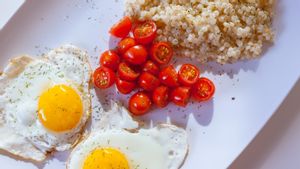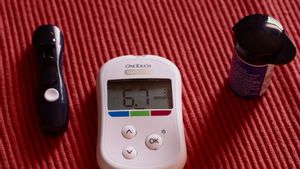JAKARTA – According to the American Diabetes Association, half of older adults have prediabetes. This condition is characterized by a tendency for blood glucose levels to be higher than normal. Prediabetes can lead to type 2 diabetes unless you make a healthier lifestyle change.
As reported by Bethesda Health, Thursday, June 1, some rules can be a reference for diet, especially for those aged 50 years and over. Whether you have been diagnosed with diabetes mellitus or not, it is necessary to assume that the right diet can have a major effect on health conditions.
Lindsay Johnson, a registered and licensed dietitian, says senior adults are particularly vulnerable to the effects of diabetes.
"Many factors associated with aging, such as depression, cognitive challenges, financial difficulties, various illnesses, and the loss of a spouse, can impair the ability and willingness of senior adults to manage their diabetes", says Lindsay.
Diet is the key to controlling diabetes. In addition, decreased energy levels can be another factor in the need to run a diet so that the body stays fit with normal blood sugar levels. Here are the dietary rules that need to be a reference for managing diabetes.
Control carbohydrates
Since diabetes depends on the production of insulin and the effectiveness of the body in managing it, people with diabetes need to coordinate the number of carbohydrates they consume.
Carbohydrate control is the key to controlling both types of diabetes, both type 1 and type 2. So it is recommended to eat a low-carb diet that includes lean protein such as nuts and fish.

Lindsay gives a reference that in a day at least consume 135 grams of carbohydrates, this can be adjusted to a person's daily activities. Most people who are losing weight are best off eating 45 grams of carbohydrates at each meal or 3 times a day.
If the activity is more active, you can add 15-20 grams of carbohydrates to keep your metabolism working without excessive snacking.
Understanding fats that are safe to eat
Some people misunderstand the fats that diabetics need to avoid. Lindsay suggests the good fats in avocados, nuts, and olive oil. Well, what should be avoided is trans fat or saturated fat.
Know what's forbidden
The list of foods that are prohibited for diabetics is sugary drinks, sugary juices, lemonade, and excessive amounts of milk. Within 1 day, Lindsay recommends drinking 1-2 cups of low-fat or skim milk.
She also recommends avoiding alcoholic beverages, limiting salt intake, avoiding packaged or processed foods, and reducing cholesterol intake to 200 milligrams per day.
Prioritize fiber intake from vegetables and fruit
Fruits and vegetables such as broccoli, spinach, asparagus, Brussels sprouts, other green vegetables, and rainbow-colored fruits are good for consumption. Includes tomatoes, grapes, apples, oranges, and cherries. Good carbs include peas, chickpeas, lentils, and sweet potatoes in controlled portions.
SEE ALSO:
Managing diabetes mindfully
By recognizing all types of abstinent and good food for consumption, you are aware that your body can be healthier if you implement it in your daily intake.
Diabetics also need to use a glucometer and read the results of the HbA1c test so that they can evaluate each treatment and improve their lifestyle if the results are not good. In principle, the diet for diabetes prioritizes portion count, type of food, and mealtimes.
To identify nutritional intake, what diet is most appropriate, and what are the taboo lists, it is recommended to consult regularly with internal medicine specialists and registered dietitians.
The English, Chinese, Japanese, Arabic, and French versions are automatically generated by the AI. So there may still be inaccuracies in translating, please always see Indonesian as our main language. (system supported by DigitalSiber.id)


















